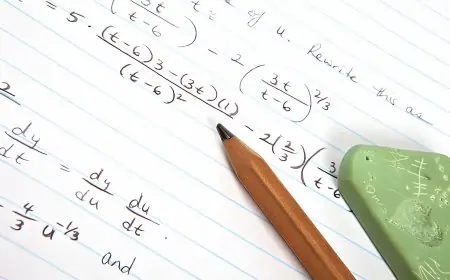Preparing for the Joint Entrance Examination (JEE) can be a daunting task, as it is one of the most competitive exams in the country. However, with the right approach and dedication, it is possible to crack the exam and pursue your dreams of becoming an engineer. Here are the key subheadings that can help you prepare for the JEE advanced marks vs rank.
Understanding The Jee Exam: Syllabus, Pattern And Marking Scheme
The JEE exam is divided into two papers - JEE Main and JEE Advanced. JEE Main is conducted twice a year and is the first stage of the exam. JEE Advanced is the second stage and is conducted only once a year. The syllabus for both papers includes topics from Physics, Chemistry, and Mathematics.
It is important to understand the syllabus, pattern and marking scheme of the exam to prepare effectively. The JEE Main exam is an online exam, with a duration of 3 hours. The paper consists of 90 multiple-choice questions, with equal weightage given to all three subjects. JEE Advanced, on the other hand, is a paper-pencil test with a duration of 3 hours per paper. The paper consists of 60 multiple-choice questions and 10 numerical answer-type questions, with varying weightage given to the three subjects.
Understanding the marking scheme of the exam is equally important. In JEE Main, each correct answer carries 4 marks, while each incorrect answer carries a negative marking of 1 mark. In JEE Advanced, each question carries different marks and there is a negative marking for incorrect answers.
Creating A Study Plan: Setting Goals And Prioritizing Topics
Creating a study plan is the first step towards effective preparation. It is important to set realistic goals and prioritize topics based on their weightage in the exam. The study plan should be divided into smaller goals that can be achieved on a daily or weekly basis.
It is important to dedicate more time to topics that carry more weight in the exam. For example, in JEE Main, topics like Mechanics, Thermodynamics, and Organic Chemistry carry more weight compared to other topics.
The Importance Of Time Management: Allocating Time And Sticking To A Schedule
Time management is crucial when preparing for the JEE exam. It is important to allocate time effectively to cover all topics in the syllabus. Students should create a schedule that balances study time with breaks and leisure activities.
It is also important to stick to the schedule and avoid procrastination. Students should identify their most productive study hours and schedule their study time during those hours.
Mastering The Basics: Strengthening Fundamentals And Building A Strong Foundation
Strengthening fundamentals is key to mastering the JEE exam. It is important to understand the basic concepts and principles of each topic. Students should focus on building a strong foundation in each subject, and gradually move on to more complex concepts.
Solving basic problems and exercises can help in strengthening fundamentals. Students should also refer to standard textbooks and study materials to get a better understanding of the concepts.
Tips For Effective Note-Taking: Making Effective Notes And Summarizing Concepts
Effective note-taking is an important skill that can help in retaining information. Students should take notes while studying, and summarize the concepts in their own words. This can help in a better understanding of the concepts.
It is also important to review and revise the notes regularly. Students should avoid copying notes from others, as it can lead to confusion and lack of understanding.
Solving Previous Year's Question Papers: Analyzing And Understanding Exam Trends
Solving previous year's question papers can help in understanding the exam trends and the type of questions asked. Students should solve the papers under exam-like conditions, and analyze their performance. This can help in identifying areas of strength and weakness, and in planning the study strategy accordingly.
Analyzing the previous year's papers can also help in understanding the pattern of questions asked, and the weightage given to each topic. This can help in prioritizing topics while preparing for the exam.
Strengthening Problem-Solving Skills: Practicing Numerical And Conceptual Questions
Problem-solving skills are crucial when preparing for the JEE exam. Students should practice both numerical and conceptual questions, and develop a systematic approach to solving problems.
It is important to understand the underlying concepts and principles while solving problems, and not just memorize formulas. Students should also focus on time management while solving problems, and try to solve them in the shortest possible time.
Tips For Effective Revision: Revisiting Concepts And Testing Understanding
Effective revision is key to retaining information and preparing for the exam. Students should revise regularly, and revisit the concepts that they find difficult to understand.
Testing understanding is also important while revising. Students should solve mock tests and quizzes, and evaluate their performance. This can help in identifying areas that need more focus and attention.
Adopting Effective Study Habits: Maintaining Consistency And Discipline
Adopting effective study habits is important while preparing for the JEE exam. Students should maintain consistency and discipline while studying, and avoid procrastination.
It is also important to take breaks and indulge in leisure activities to avoid burnout. A healthy diet and exercise can also help in maintaining focus and concentration.
Staying Motivated: Overcoming Challenges And Focusing On Success
Staying motivated is crucial when preparing for the JEE exam. Students should set realistic goals and celebrate small successes to stay motivated.
It is important to overcome challenges and failures and focus on success. Students should also seek help and guidance from Infinity Learn’s teachers, mentors, and peers to stay motivated.
Conclusion
Preparing for the JEE exam requires dedication, hard work, and a systematic approach. Understanding the syllabus, pattern and marking scheme of the exam, creating a study plan, mastering the basics, and adopting effective study habits can help in preparing effectively for the exam. Solving previous year's papers, strengthening problem-solving skills, and effective revision can also help in achieving success in the exam. Staying motivated and focused on success can help in overcoming challenges and achieving the ultimate goal of cracking the JEE foundation course.























